Geoff worked hard to prepare for our first water. He had been rotavating, hoeing channels and trying to plan ever since we bought the hours from Juan Jose. We had never seen la manta * in action. We had no way of knowing exactly how water would find its levels around the various parts of the land and any previous system of ditches or channels had long since disappeared.
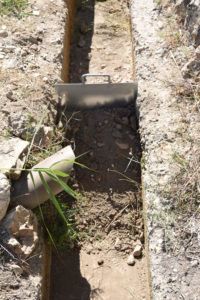
The sluice gate in place with soil banked against it to minimise leakage
Advice from Jose Manuel was gratefully received, but without some frame of reference from past experience, it was difficult to know how to put it into practice. Geoff decided to put in some channels at the top of the section to be watered and then direct the water by hoeing ad hoc channels on the day.
The night before we went through the plan and synchronised watches. (The watches were figurative, as neither of us has worn a watch in years – one of the perks of Mañana Society membership)
We had everything planned, every option covered, every i and t dotted and crossed, but not necessarily in that order.
- 8:30am Lynn to go with Dave to collect a nice young man to help with digging duties. Geoff to install sluice gates at correct locations.
- 9:00am Geoff and NYM to clear debris, repair any ruptures and generally prepare Geoff’s trenches for distribution of water.
- 10:00am Geoff and Lynn to meet Diego for the showing of the ropes
- 10:30am G&L meet with Pedro down at the well to pay money and get pump turned on
- 10:35 G&L to leg it back to the house and deal with gushing torrents of water.
Everything went perfectly on schedule until 9:45, when Diego arrived a little earlier than planned. That was not a problem. We followed him as he sprinted along the mud track, goat-like and far too sprightly to be as old as he looks (pushing ninety!)
He led us past the turning for our first sluice gate, across a grove of oranges and down past the gipsy chap with two cockerels’ house. (Everyone knows who we mean when we wave our arms in the direction of his place. There is only one house there, so remembering to ask him his name is a low priority.) Scrabbling down a bank, Diego lead us to a huge valve, which he showed us had to be turned and then wedged in position with a special lump of wood, left on the side for the purpose.
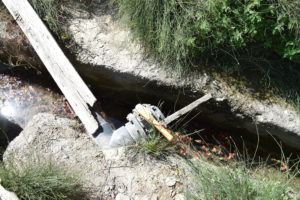
The valve, held in place by the special lump of wood
Down another, steeper bank and across another patch of fruit trees, then down through a bamboo thicket, we came out into the dry river bed at the bottom of our land, just couple of hundred yards or so further along. He pointed us to where the arrays of solar panels stand on the other side of the river valley and told us this was where we should meet Pedro.
“Do we need to turn the valve the other way when we have finished?” we asked, as we made our way back to base.
“No, the next person will change it if they need to.”
We thanked Diego very much. He waved away our thanks and sprinted off to do whatever work he had lined up for the day on his own land.
By this time, the sun was well and truly up, and we were constantly swatting at the flies that were determined to make the most of the saltwater we were exuding at an alarming rate. Geoff was perspiring like a stuck pig and I was glowing so much that the liquid radiance was streaming into my eyes and blinding me.
We decided it was time for a long drink and a rest, so Dave, Geoff, Jordan (the NYM) and I gulped down gallons of cold water and soft drinks, sitting or standing wherever we could find a patch of shade.
It wasn’t long before we had to repeat the trip down to the meeting point by the solar panels. The panels are situated to catch the maximum possible sunshine, which is a bit of a pain when you are standing waiting for someone who rolls up twenty minutes late. We stood sweltering in the sun, wondering if we had misunderstood something when we made arrangements. We had almost decided to go home and try calling him when he finally rolled up in his little silver van.
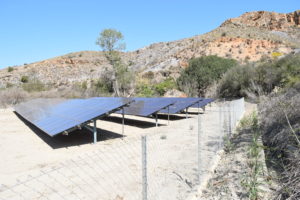
Over a hundred panels power the pump
We have since found that this was Pedro functioning at his most efficient – he has not turned up at all once, double-booked us so we did not get any water once and forgotten us so we had to phone him and get him to come along forty minutes late once. He is consistently difficult to get hold of, as he hardly ever answers his mobile. When he does answer, he rarely agrees to our proposed time for water, offering another time, day or week, as the whim takes him. He makes no concessions and takes no prisoners when dealing with my attempts to communicate. He is an affable nightmare to deal with.
Pedro finally arrived and worked his subtle magic inside the locked enclosure. We paid him and legged it up to the large valve, which was leaking badly. A swift adjustment of the high tech lump of wood (by whacking it with a rock) soon sorted that and we hurried to get to our house before the rushing torrent.
Part of the path runs alongside the acequia as it approaches our land. We were slightly surprised that no water was in evidence when we reached it. We walked along to the house and peered over the side of the ramp that crosses the acequia onto the land.
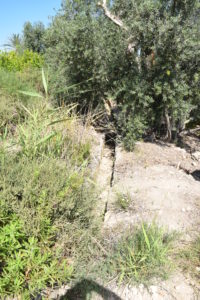
Bone dry, waiting for water
Bone dry. The trees were grey and creaking in the heat, the ground parched and cracked, the landscape shimmering slightly under its coating of dust. The bottom of the acequia had various stones, twigs and patches of dry dust lining its bottom. There was no sign of any water.
We looked along the channel, as it threaded through the overgrown patch Paco owns but never tends. Grasses and pomegranate branches hung low over the channel. Beyond them, Diego’s section of acequia was clear on both sides but still dusty and empty. No sign of any water.
Geoff walked back to the sluice to check whether the water had reached the acequia. He returned, camera in hand and reported that there was water gushing out. He had taken a photograph to record the momentous event. There was still, however, no sign of it reaching us. It only had another couple of hundred yards to come, but it was taking its sweet time about it!
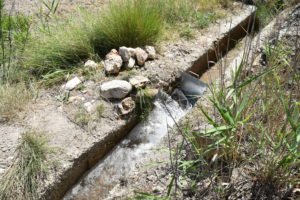
Water was gushing out by the sluice
“Hold on! There’s a glimmer over there!”
Yes, there was. Under the branches of the fruit trees, about thirty yards away, something was happening. Could it be water?
We watched eagerly as the glimmer became a twinkle and the twinkle made its way at a slow dawdle toward us. A thin trickle was weaving its way between the pebbles and piles of dust in the bottom of the acequia. It was probably a couple of inches wide and a quarter of an inch deep. Our plans to flood the land and revive the trees seemed faintly ridiculous in the light of this pathetic little puddle.
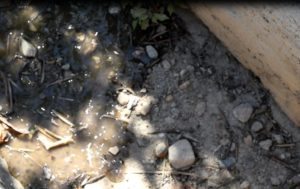
The tiny trickle was beginning to push twigs and debris ahead of it
As the trickle came closer to the ramp, we could see that it was pushing a scum of twigs and leaves ahead of it. The bottom of the acequia was beginning to disappear as the sludge was pushed along and the water gradually became deeper.
About twenty minutes after Pedro had turned the valve, the water had risen up enough in the acequia for it to overflow into the trench Geoff and Jordan had cleared down the side of our land. It began to flow down the trench as they scrabbled with their hoes to make sure the sides did not cave in and obstruct the water. They were like midwives, gently encouraging it to push its way along to the orange trees. The water baby seemed in no hurry to get born.
Without warning and almost imperceptibly, the water grew deeper and flowed faster until it was leaping and skipping along the trench. It was difficult to keep up with it, as it made its way past the dog compound, over a small drop and down onto the level we were planning to water.
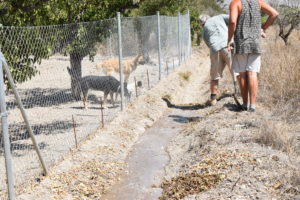
The dogs were desperate to ‘help’
The dogs were shouting and jumping at the fence of their compound, desperate to see what was happening. Poppy had always loved playing in the river near where we used to live, so I knew she would welcome the chance to ‘help.’ I was not so sure about Min, who is a wuss where running water is concerned. Teddy was a completely unknown quantity, but more or less guaranteed to throw himself into things with enthusiasm.
I decided to let them out of the compound to join in the fun.
By the time I had opened the gate and followed them down to where Geoff and Jordan were, the water in the trench was running fast and deep. It had washed away all the weeds, dust, soil and twigs. The bottom of the trench was now pebbles, smooth, colourful and shining through the crystal clear water.
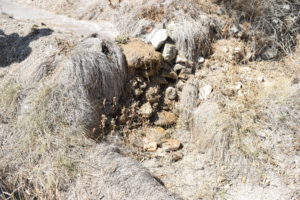
A small waterfall
The dusty section of dry-stone wall between the top level and the next had become a small waterfall. I had rather a moment there, watching the water cascading over the top and down onto the parched land, which had last been watered years ago. The sun bounced off the water as it rushed and babbled over the stones. A season of refreshing and renewal was about to really take hold. The dream was becoming a practical reality, far greater than our plans and preparation had been able to envisage. Our trees, which had been on the brink of death would (we hoped) come back to life and be fruitful again.
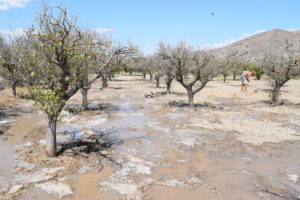
The ditches were overwhelmed
While Geoff and Jordan dug frantically with their hoes to try to direct the water around the field and down to the trees at the bottom, Min disappeared up to her back in mud. I was still trying to think how to rescue and comfort her when she struggled out under her own steam, grinning from ear to ear. She yapped happily and bounced from puddle to puddle to join Ted and Poppy.
Geoff’s preparatory ditches were soon completely overwhelmed and the water flooded between the trees, transforming the dry, cracked field of dust into a glorious wallow of epic proportions, just perfect for three exuberant dogs to splash about in.
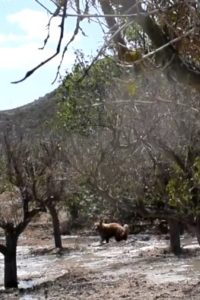
Ted enjoying the mud
They went wild. Poppy and Ted ran full tilt along the main trench, and then around the trees shouting their glee at being up to their bellies in mud. They all took it in turns digging in the water, bottoms in the air, tails wagging furiously. They woofed. They played tag. They ran some more, obviously glorying in the physical, sensual, sun-drenched, mud-covered joyousness of abundant water after a long season of drought.
It was enough to make one wish one could be a dog, or, at the very least, a child, sploshing about, filthy and soaked, immersed in the mud and the moment.
Even the air began to smell different. My poor nostrils, desiccated and dust-blasted to a sort of taut malaise, began to twitch at the subtle scent of damp earth. This was an olfactory promise, if ever I sniffed one: earth that smelled so fresh and wholesome had to produce good things, surely.
For those with hoes there followed a couple of hours of hard work. For those without, the time passed all too quickly. At the end of our two and a half hours, the water flow began to slow. Gradually the level in the channel fell. The water in the acequia seemed to lose interest and dwindled back to a standstill, just covering the bottom.
By this time, everyone was ready for lunch, so we cleaned up and tucked in. Only time would tell if the water had come in time to save the trees, but we were optimistic. It seemed ridiculous to think they could resist this deluge of watery blessing that had swept away all in its path and had all of us (to a greater or lesser extent) moistly enthralled.
* La manta – literally the blanket – is how the locals describe the flooding technique they use to irrigate the land

